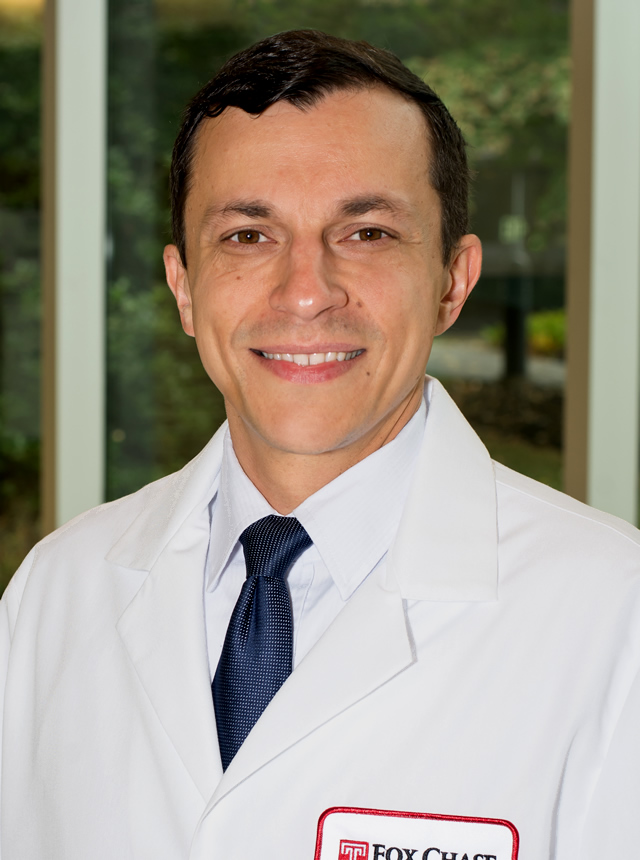Weather Alert: Following the winter storm, all Temple Health hospitals, campuses and clinical locations remain open. Patients will be contacted directly if their visit is affected. Please check TempleHealth.org or FoxChase.org for updates and monitor myTempleHealth for changes to scheduled appointments.
Breadcrumb
- Home
- Fox Chase Cancer Center News
- Yanis Boumber, MD, PhD, Returns to Fox Chase in the Department of Thoracic Oncology and Molecular Therapeutics Program
Yanis Boumber, MD, PhD, Returns to Fox Chase in the Department of Thoracic Oncology and Molecular Therapeutics Program

PHILADELPHIA (October 3, 2016) – Yanis Boumber, MD, PhD, will join the Department of Thoracic Medical Oncology and the Molecular Therapeutics Program at Fox Chase Cancer Center starting Oct. 3.
Boumber first joined Fox Chase’s Department of Medical Oncology in 2013 and now returns to Fox Chase from the University of New Mexico Comprehensive Cancer Center. He specializes in treating patients with thoracic cancers, including lung cancer, thymoma, and mesothelioma, and his clinical and research focus at Fox Chase will be on thoracic malignancies.
“Dr. Boumber is an accomplished scientist and a compassionate clinician,” said Jonathan Chernoff, chief scientific officer at Fox Chase. “His unique skill set is an important asset to the Center as we pursue our mission to prevail over cancer.”
Boumber received his medical degree from Rostov State Medical University as well as a doctoral degree in cancer biology and molecular biology from the University of Texas MD Anderson Cancer Center and Graduate School of Biomedical Sciences. He completed an internal medicine residency at Good Samaritan Hospital, an affiliate of Johns Hopkins University, as well as both clinical and research fellowships at the University of Texas MD Anderson Cancer Center.
“Having worked at Fox Chase earlier in my career, I enjoyed the atmosphere and culture of support here,” Boumber said. “The caliber of Fox Chase’s clinicians and researchers is second to none. I look forward to joining the staff once again and offering comfort and care to all who walk through the doors.”
In his time away from Fox Chase, Boumber has continued to collaborate with numerous Fox Chase scientists and clinicians.
Boumber and Erica Golemis, PhD, deputy chief science officer and coleader of molecular therapeutics at Fox Chase, led a study that found the Musashi-2 protein, a regulator of mRNA translation, may serve as a predictive biomarker of non-small cell lung cancer aggressiveness. Their findings were published in the Proceedings of the National Academy of Sciences in June 2016.
In further work with Golemis and another colleague, James Duncan, Ph.D., Boumber helped identify a role for the TGF-beta/BMP superfamily member anti-Mullerian hormone (AMH) in drug resistance in non-small cell lung cancer, and also evaluated STA-8666, a promising new targeted therapy for lung cancer. These findings were published in Clinical Cancer Research in June 2016, and in Cell Reports in July 2016.
Fox Chase Cancer Center (Fox Chase), which includes the Institute for Cancer Research and the American Oncologic Hospital and is a part of Temple Health, is one of the leading comprehensive cancer centers in the United States. Founded in 1904 in Philadelphia as one of the nation’s first cancer hospitals, Fox Chase was also among the first institutions to be designated a National Cancer Institute Comprehensive Cancer Center in 1974. Fox Chase is also one of just 10 members of the Alliance of Dedicated Cancer Centers. Fox Chase researchers have won the highest awards in their fields, including two Nobel Prizes. Fox Chase physicians are also routinely recognized in national rankings, and the Center’s nursing program has received the Magnet recognition for excellence six consecutive times. Today, Fox Chase conducts a broad array of nationally competitive basic, translational, and clinical research, with special programs in cancer prevention, detection, survivorship, and community outreach. It is the policy of Fox Chase Cancer Center that there shall be no exclusion from, or participation in, and no one denied the benefits of, the delivery of quality medical care on the basis of race, ethnicity, religion, sexual orientation, gender, gender identity/expression, disability, age, ancestry, color, national origin, physical ability, level of education, or source of payment.
For more information, call 888-369-2427